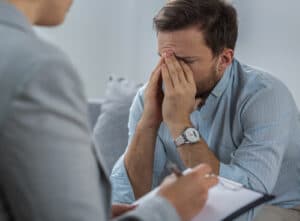Addiction is a multi-layer situation that not only affects a person’s body but their behavior and mind as well. It may be able to spot the physical symptoms and effects of drugs and alcohol. However, the mental deterioration of someone with an addiction can be painful and problematic. Often, a person is dealing with deeper issues that can cause the individual to drink excessively or abuse drugs. This is where addiction psychiatry can help a person deal with these feelings and memories.
During addiction treatment, a person must truly understand the root cause of their addiction. Without addressing both sides of the problem, a person can never really recover because of the vicious cycle that has been developed. This is especially true in cases of co-occurring or dual diagnosis cases. This occurs when a person is dealing with a mental health disorder and an addiction. These cases can be very stressful and usually require inpatient treatment with addiction psychiatry.
Some rehab centers allow addiction psychiatry as a way to effectively deal with the feeling and emotions in a person. This is an essential part of addiction treatment and is required in cases of co-occurring disorders. At the end of the day, it’s important to get quality treatment from a center you can trust. Free by the Sea is here to help you get to a better place, physically and mentally. You don’t have to go through this fragile journey alone, let us help you today.
What is Psychiatry?
Psychiatry is a branch of medicine that focuses on the treatment and prevention of mental and behavioral disorders. What makes psychiatry unique is that a psychiatrist is qualified to treat both the physical and mental problems a person may have. This becomes extremely beneficial and useful in an addiction setting. Addiction affects both the body and the mind, so having a professional who can help with both facets is very important.

Addiction psychiatry implements a number of different techniques to treat addiction and mental illness. This includes a combination of psychotherapy (talk therapy), medication, and other treatments. Additionally, psychiatrists have a firm grasp of the connection between mental illnesses, genetics, family history, and emotions. This is crucial in cases of addiction and substance abuse.
The main difference between a regular therapist and a psychiatrist for addiction is that a physiatrist is considered a medical doctor. This can provide another level of care when it comes to addiction treatment. This is not to say that therapists and other clinicians can’t be of help but physiatrists can be extra effective in some addiction cases.
Psychotherapy During Addiction Treatment
One of the vital parts of addiction psychiatry is the use of various psychotherapy methods. This typically has a person opening up about their past and present behaviors. Since the underlying feelings and mental processes of a person affects a person’s addiction, it’s important to highlight this. As with all cases of addiction treatment, the substance abuse psychiatrist will meet with the person on a weekly or daily basis (depending on the program).
There are various different types of therapy that are used. These can be used for a variety of different cases and some may work better than others (depending on the case). Let’s take a look at some of the psychotherapy options that are used during addiction psychiatry:
Cognitive Behavioral Therapy (CBT)
Cognitive-behavioral therapy (CBT) is often used to change a person’s behaviors. CBT is used to treat various disorders like depression, anxiety, alcohol and drug disorders, and other mental illnesses. CBT primarily works in changing negative thoughts while helping improve behavior. Behavior and negative thoughts are two clear issues of addiction. CBT is one of the most commonly used forms of psychotherapy and is typically used in addiction psychiatry.
Dialectical Behavior Therapy (DBT)
Dialectical behavior therapy (DBT) is also another widely used form of psychotherapy for addiction and mental illnesses. This type of therapy focuses on teaching personal skills and other techniques for coping with stress. DBT also helps you understand and deal with the destructive and inaccurate thoughts that may be present in addiction cases. Dialectical behavior therapy is extremely effective in cases of addiction and mental illness.
Medication use in Addiction Psychiatry
All substance abuse psychiatrists are considered medical doctors and have the qualifications to treat both the physical and the mental. Since addiction is a multifaceted situation, the substance abuse psychiatrist will be able to prescribe and use medication during treatment. Having a medical professional that knows the ins and outs of all disorders you may be experiencing can be highly beneficial and convenient as well.
The medication that is used during treatment is usually to treat the different symptoms of mental disorders or addiction. Some medications can help a person rebalance their brain chemistry (which is a common scene when it comes to mental illnesses). Medication is almost always used in cases of addiction. This is to ease the withdrawal symptoms and other mental symptoms. Some medications may have some side effects, so it’s important to seek professional guidance in addiction treatment and recovery. Common medications used include the following:
- Stimulants
- Hypnotics
- Mood stabilizers
- Antidepressants
- Sedatives/anxiolytics
- Antipsychotic medication
Psychiatric Services for Co-Occurring Disorders
In some situations, a person will be struggling with an addiction and a mental health disorder. This can cause a problematic and potentially dangerous situation for the person. As a person’s addiction persists, their mental illness begins to worsen. Many turn to drugs or alcohol initially to help them cope with their mental disorder – unfortunately, the opposite is true. Drugs and alcohol tend to worsen their case instead of making it better.
The person can develop a dangerous cycle of unwanted symptoms which lead to more drug use for relief (which eventually creates a cycle). Co-occurring disorders usually require intensive care and attention. During treatment, a person will get care for both the mental disorder and the addiction. This will occur simultaneously but separately (for effective treatment).
Through addiction psychiatry, a person can get help for the physical symptoms of their addiction and mental disorder at the same time. The medical side of physiatry is what separates it from regular psychotherapy and therapists in general. If you or a loved one is suffering from addiction (or a co-occurring disorder), it may be time to look for professional help. At Free by the Sea, we’re ready to help you fight the waves of addiction so you can start living a happier, better life.
Why Are Psychiatric Services Important?
In many instances, codependency and bipolar disorder work together to fuel addiction. Individuals dealing with these mental health issues attempt to self-medicate by using drugs and alcohol. Only programs address the challenges of co-occurring conditions, such as addiction coupled with mental health disorders. Our plan can offer long-term recovery treatment. By using a combined treatment approach, individuals are taught how to manage their addiction and their mental health issues without falling back on substance abuse.
Many individuals have no clue they are struggling to overcome both their addiction and a mental health problem. Most only realize that if they abuse drugs, they feel better, and the negative emotions they experience are subdued. These individuals may be battling extreme anxiety, accelerated levels of stress, or major depression. Sadly, when an individual is facing these challenges, they may be unaware that there are healthy ways to address their emotional issues. Granted, using addictive substances provides immediate but temporary relief.
 In the long term, substance abuse will only exacerbate the original problem. Self-medicating creates a spiral behavioral pattern where a person consistently needs more of a particular substance to avoid the uncomfortable emotions connected with mental health challenges. Over time, the individual is both psychologically and physiologically dependent on the substance. Treatment programs that take a holistic approach focus on treating the entire person rather than just focusing on one aspect of the individual’s life.
In the long term, substance abuse will only exacerbate the original problem. Self-medicating creates a spiral behavioral pattern where a person consistently needs more of a particular substance to avoid the uncomfortable emotions connected with mental health challenges. Over time, the individual is both psychologically and physiologically dependent on the substance. Treatment programs that take a holistic approach focus on treating the entire person rather than just focusing on one aspect of the individual’s life.
Why Choose Free by the Sea?
When reaching out for professional treatment, it’s important to be guided by a rehab center you can trust. At Free by the Sea, we offer effective treatment with quality and safety. We understand how brutal and unforgiving addiction can truly be, that’s why we do everything we can to ensure success and sobriety with all our patients. If you or a loved one is struggling with addiction, don’t wait, get help right now.
Free by the Sea has a welcoming and passionate staff that’s ready to provide you the proper help for your addiction. Our facility is distraction-free and accommodating for all your needs. Whether you need addiction psychiatry or residential treatment, we’ll be by your side no matter what. Contact us today to learn about our treatment options and recovery resources.

Dr. Richard Crabbe joined our team in 2019 as our psychiatrist and medical director. He attended the University of Ghana Medical School where he became a Medical Doctor in 1977. From 1978 through 1984, he was a medical officer in the Ghana Navy and provided a variety of services from general medicine to surgeries. He received his Certificate in General Psychology from the American Board of Psychology and Neurology in 2002.
Insurances We Accept
Free by the Sea recognizes the importance of having insurance to receive addiction treatment. Let us work with you to provide you or a loved one with premier addiction treatment services. We accept several private insurance plans. Verify your rehab coverage with us today to ensure you receive the support that you need! Find out if you are covered today!











